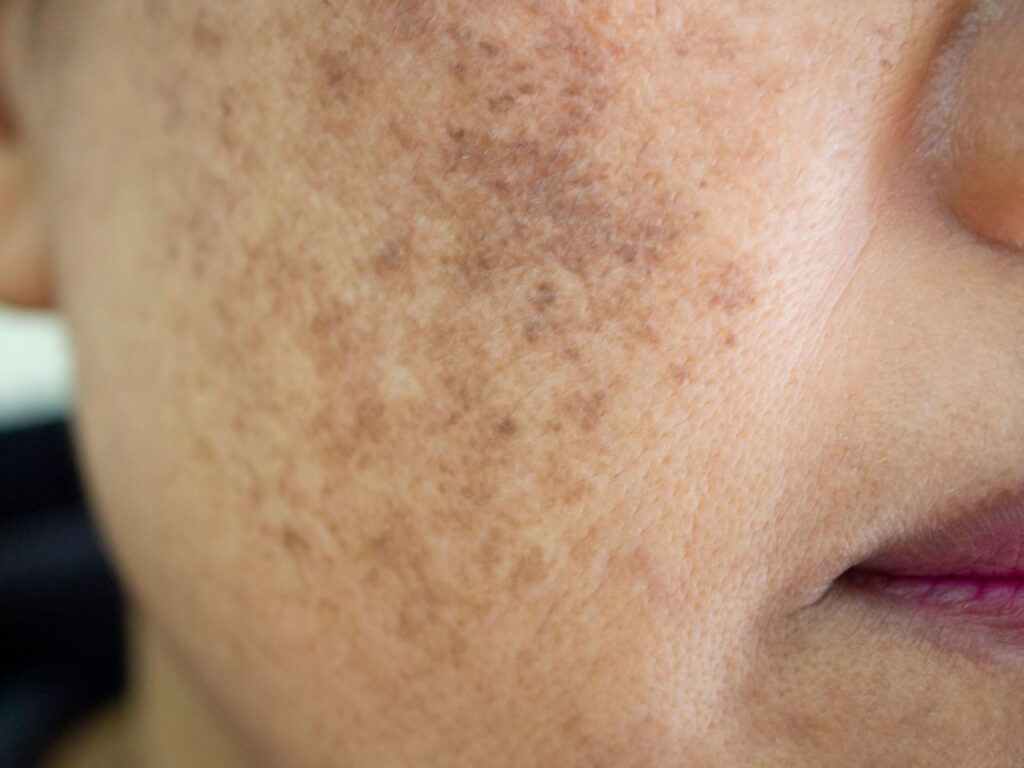
Melasma (also known as chloasma), is a condition characterized by the appearance of irregular patches of darkened skin on the face or forearms. These tan or brown spots typically appear symmetrically around the brow, cheeks, nose, or upper lip. Melasma is a common condition, especially among women, and it can be triggered by factors such as sun exposure or hormonal changes as seen during pregnancy or menopause. People with darker skin tones are more susceptible to developing melasma than those with lighter complexions.
Dr. Solomon Brickman, a Board Certified Dermatologist at Houston Laser Skin Center, has extensive experience in treating patients with melasma.
What is known to cause melasma?
Currently, the exact cause of melasma unknown. However, experts believe that various factors, such as having an olive-toned complexion, hormonal fluctuations, family history, medications, or being exposed to other substances that make the skin more susceptible to discoloration when exposed to UV rays.
Nonetheless, excessive exposure to sunlight is considered the primary cause of melasma, especially in individuals with a genetic predisposition to the condition. Studies have shown that people tend to develop melasma more often during the summertime when sunlight is most intense. Hyperpigmentation tends to become less visible or milder in the winter months.
What are the symptoms of melasma?
Melasma is characterized by the presence of discoloration or hyperpigmentation, primarily affecting the facial areas. There are three common facial patterns observed in individuals with melasma:
- Centrofacial, or hyperpigmentation around the central part of the face, encompassing the cheeks, upper lip, nose, chin, and forehead.
- Malar, or a pattern appears between the upper cheeks and the cheekbones.
- Mandibular, or hyperpigmentation that runs parallel to the jawline.
These distinctive patterns help with the melasma diagnosis as well as subsequent determining the right course of treatment. Dr. Brickman will analyze your face to confirm whether or not your current skin condition is related to melasma.
Melasma is commonly considered a chronic disorder, indicating that it is long-lasting in nature. For some individuals, melasma persists for many years or even throughout their entire lives. However, in certain cases, the condition may only last for a short duration, such as during pregnancy. Pregnant women sometimes experience melasma, and it may improve or fade after childbirth. Nevertheless, for many others, melasma is a persistent skin condition that requires ongoing management and care.
What are my treatment options?
Laser therapy is an effective treatment option for addressing hyperpigmentation associated with melasma. Dr. Brickman uses the most advanced laser technology available in the aesthetic market that will specifically target brown spots. Laser melasma treatments are quick, comfortable sessions that will be effective regardless of the size the spots.
During your laser therapy session for melasma, you will be comfortably seated in a private treatment room while the handheld laser device applied to the targeted area(s). The session is relatively quick and easy. and you can immediately return home afterwards as there is little to no downtime.
Up to 5 sessions may be necessary for optimal results, based upon the size of the melasma spots, spaced one month apart. The spaced intervals between sessions allow for the skin to heal and for the gradual improvement of the hyperpigmented areas. Afterwards, patients will enjoy much clearer, more even-toned skin.
Contact Dr. Brickman about your melasma concerns today
If you are showing signs of melasma, your first step should be to contact Dr. Solomon Brickman of Houston Laser Skin Center. As a practicing dermatologist of over 40 years, Dr. Brickman has extensive experience in treating various skin conditions, including melasma. Melasma may be a condition that you are self-conscious about, but advanced laser treatment options are available. To see if the laser treatment would be right for your condition, schedule an appointment with Dr. Brickman today!
